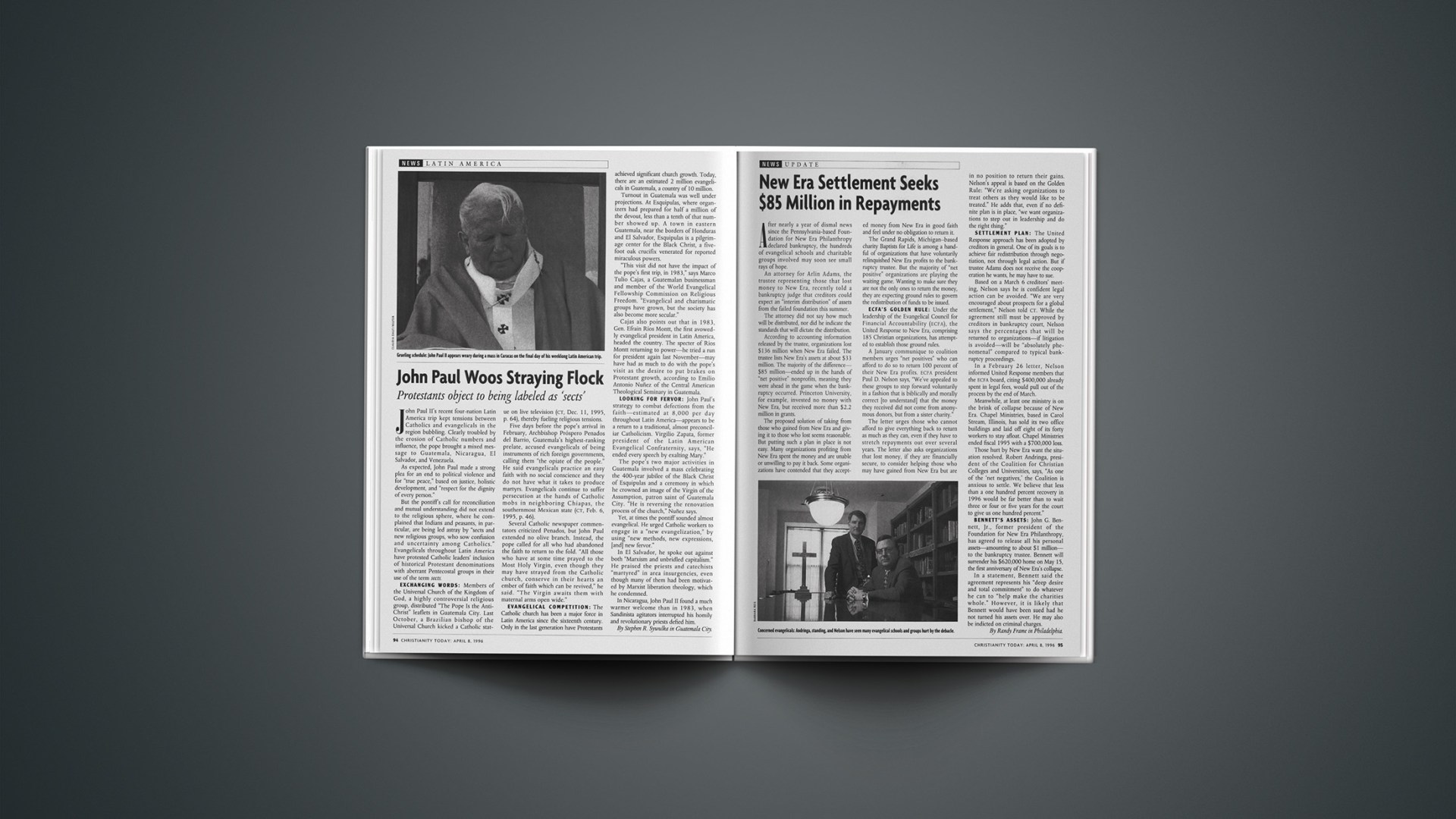After nearly a year of dismal news since the Pennsylvania-based Foundation for New Era Philanthropy declared bankruptcy, the hundreds of evangelical schools and charitable groups involved may soon see small rays of hope.
An attorney for Arlin Adams, the trustee representing those that lost money to New Era, recently told a bankruptcy judge that creditors could expect an “interim distribution” of assets from the failed foundation this summer.
The attorney did not say how much will be distributed, nor did he indicate the standards that will dictate the distribution.
According to accounting information released by the trustee, organizations lost $136 million when New Era failed. The trustee lists New Era’s assets at about $33 million. The majority of the difference—$85 million—ended up in the hands of “net positive” nonprofits, meaning they were ahead in the game when the bankruptcy occurred. Princeton University, for example, invested no money with New Era, but received more than $2.2 million in grants.
The proposed solution of taking from those who gained from New Era and giving it to those who lost seems reasonable. But putting such a plan in place is not easy. Many organizations profiting from New Era spent the money and are unable or unwilling to pay it back. Some organizations have contended that they accepted money from New Era in good faith and feel under no obligation to return it.
The Grand Rapids, Michigan-based charity Baptists for Life is among a handful of organizations that have voluntarily relinquished New Era profits to the bankruptcy trustee. But the majority of “net positive” organizations are playing the waiting game. Wanting to make sure they are not the only ones to return the money, they are expecting ground rules to govern the redistribution of funds to be issued.
ECFA’S GOLDEN RULE: Under the leadership of the Evangelical Council for Financial Accountability (ECFA), the United Response to New Era, comprising 185 Christian organizations, has attempted to establish those ground rules.
A January communique to coalition members urges “net positives” who can afford to do so to return 100 percent of their New Era profits. ECFA president Paul D. Nelson says, “We’ve appealed to these groups to step forward voluntarily in a fashion that is biblically and morally correct [to understand] that the money they received did not come from anonymous donors, but from a sister charity.”
The letter urges those who cannot afford to give everything back to return as much as they can, even if they have to stretch repayments out over several years. The letter also asks organizations that lost money, if they are financially secure, to consider helping those who may have gained from New Era but are in no position to return their gains. Nelson’s appeal is based on the Golden Rule: “We’re asking organizations to treat others as they would like to be treated.” He adds that, even if no definite plan is in place, “we want organizations to step out in leadership and do the right thing.”
SETTLEMENT PLAN: The United Response approach has been adopted by creditors in general. One of its goals is to achieve fair redistribution through negotiation, not through legal action. But if trustee Adams does not receive the cooperation he wants, he may have to sue.
Based on a March 6 creditors’ meeting, Nelson says he is confident legal action can be avoided. “We are very encouraged about prospects for a global settlement,” Nelson told CT. While the agreement still must be approved by creditors in bankruptcy court, Nelson says the percentages that will be returned to organizations—if litigation is avoided—will be “absolutely phenomenal” compared to typical bankruptcy proceedings.
In a February 26 letter, Nelson informed United Response members that the ECFA board, citing $400,000 already spent in legal fees, would pull out of the process by the end of March.
Meanwhile, at least one ministry is on the brink of collapse because of New Era. Chapel Ministries, based in Carol Stream, Illinois, has sold its two office buildings and laid off eight of its forty workers to stay afloat. Chapel Ministries ended fiscal 1995 with a $700,000 loss.
Those hurt by New Era want the situation resolved. Robert Andringa, president of the Coalition for Christian Colleges and Universities, says, “As one of the ‘net negatives,’ the Coalition is anxious to settle. We believe that less than a one hundred percent recovery in 1996 would be far better than to wait three or four or five years for the court to give us one hundred percent.”
BENNETT’S ASSETS: John G. Bennett, Jr., former president of the Foundation for New Era Philanthropy, has agreed to release all his personal assets—amounting to about $1 million—to the bankruptcy trustee. Bennett will surrender his $620,000 home on May 15, the first anniversary of New Era’s collapse.
In a statement, Bennett said the agreement represents his “deep desire and total commitment” to do whatever he can to “help make the charities whole.” However, it is likely that Bennett would have been sued had he not turned his assets over. He may also be indicted on criminal charges.
Copyright © 1996 Christianity Today. Click for reprint information.










